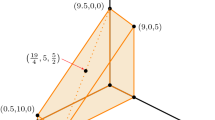Abstract
We study Stackelberg games with incomplete information in a general setting. In particular, we deduce the follower's reaction function, a set-valued function of the leader's action choice and a parameter specifying the follower's payoff type (a parameter about which the leader has only incomplete information), and using a generalized version of Komlos' Theorem due to Balder (1987), we show the existence of an expected payoff maximizing, incentive compatible strategy for the leader given the follower's reaction function.
Similar content being viewed by others
References
Ash RB (1972) Real Analysis and Probability. Academic Press, New York
Balder EJ (1984) A General Approach to Lower Semicontinuity and Lower Closure in Optimal Control Theory. SIAM J Control and Optimization 22: 570–598
Balder EJ (1987) New Sequential Compactness Results for Spaces of Scalarly Measurable Funtions. Preprint No. 488, Department of Mathematics, University Utrecht, (forthcoming in J Math Anal Appl.)
Bartle RG (1976) Elements of Real Analyis. John Wiley & Sons, New York
Berge C (1963) Topological Spaces. MacMillan, New York
Banks JS, Sobel J (1987) Equilibrium Selection in Signaling Games. Econometrica 55: 647–661
Castaing C, Valadier M (1977) Convex Analysis and Measurable Multifunctions, Lecture Notes in Mathematics No. 580, Springer-Verlag, Berlin
Chan Y, Thakor AV (1987) Collateral and Competitive Equilibria with Moral Hazard and Private Information. J Finance 42: 345–363
Dsosu L, Shaozhong C (1983) On Fixed Point Theorems for Random Set-Valued Maps. Nonlinear Anal 7: 309–323
Green JR (1973) Temporary General Equilibrium in a Sequential Trading Model with Spot and Future Transactions. Econometrica 41:1103–1124
Grossman SJ, Hart OD (1983) An Analysis of the Principal-Agent Problem. Econometrica 51:7–45
Harsanyi JC (1967/8) Games with Incomplete Information Played by ‘Bayesian’ Players. Management Sci 14:159–189, 320–334, 486–502
Himmelberg CJ (1975) Measurable Relations. Fund Math 87:53–72
Himmelberg CJ, Van Vleck FS (1975) Multifunctions with Values in a Space of Probability Measures. J Math Anal Appl 50: 108–112
Holmstrom B (1979) Moral Hazard and Observability. Bell J Econ 10: 74–91
Komlos J (1967) A Generalization of a Problem of Steinhaus. Acta Math Acad Sci Hungary 18: 217–229
Maskin E, Riley J (1984) Monopoly with Incomplete Information. Rand J Econ 15: 171–196
Matthews S, Moore J (1987) Monopoly Provision of Quality and Warranties: An Exploration in the Theory of Multidimensional Screening. Econometrica 55: 441–467
Myerson RB (1979) Incentive Compatibility and the Bargaining Problem. Econometrica 47:61–74
Myerson RB (1982) Optimal Coordination Mechanisms in Generalized Principal-Agent Problems. J Math Econ 10: 67–81
Nowak AS (1984) On Zero-Sum Stochastic Games with General State Space I. Probab Math Statist 4: 13–32
Page Jr FH (1987) The Existence of Optimal Contacts in the Principal-Agent Model. J Math Econ 16:157–167
Parthasarathy KR (1967) Probability Measures on Metric Spaces. Academic Press, New York, 1967
Robinson SM, Day R (1974) A Sufficient Condition for Continuity of Optimal Sets in Mathematical Programming. J Math Anal Appl 45:506–511
Rogerson WP (1985) The First-Order Approach to the Principal-Agent Problem. Econometrica 53: 1357–1367
Schal M (1974) A Selection Theorem for Optimization Problems. Arch Math 25: 219–224
Shavell S (1979) Risk Sharing and Incentives in the Principal and Agent Relationship. Bell J Econ 10: 55–73
Author information
Authors and Affiliations
Additional information
I would like to thank an anonymous referee and Erik Balder for helpful comments.
Rights and permissions
About this article
Cite this article
Page, F.H. Incentive compatible strategies for general stackelberg games with incomplete information. Int J Game Theory 18, 409–421 (1989). https://doi.org/10.1007/BF01358801
Received:
Revised:
Issue Date:
DOI: https://doi.org/10.1007/BF01358801



